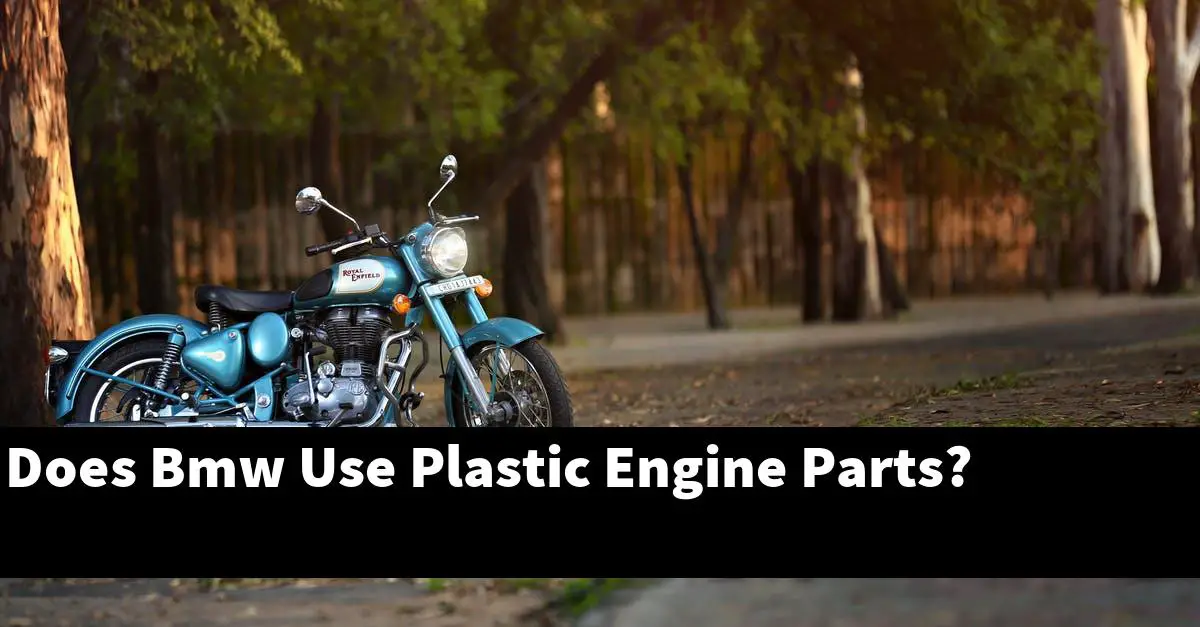The German automaker BMW has been using plastic engine parts in its vehicles for many years. These parts are often lighter and more durable than metal parts, and can help improve fuel economy.
BMW has been able to use plastic engine parts without sacrificing performance or quality, and the company is always looking for ways to improve its vehicles.
Are genuine BMW parts worth the money?
It depends on a variety of factors, including the make and model of the car, the quality of the part, and the price. However, generally speaking, genuine BMW parts are usually worth the money.
3 Best BMW engine
BMW has a long and successful history in the automotive industry, and their engines are no exception. With a variety of engines to choose from, there is an engine perfect for any BMW buyer.
The 3 best BMW engines are the S54, the M54, and the N55.
The S54 engine is a 4-cylinder, turbocharged engine that makes 285 horsepower and 280 pound-feet of torque. It is perfect for those who want performance and efficiency.
The M54 engine is a 6-cylinder engine that makes 333 horsepower and 325 pound-feet of torque. It is perfect for those who want power and luxury.
The N55 engine is a 8-cylinder engine that makes 414 horsepower and 400 pound-feet of torque. It is perfect for those who want the best performance and fuel efficiency.
Is BMW engine made of plastic?
It depends on the definition of “plastic” that is being used. Many people would say that the BMW engine is not made entirely of plastic, as the metal parts of the engine are also responsible for providing strength and durability.
Are all BMW parts made by BMW?
The answer to this question is no, not all BMW parts are manufactured by the Bavarian automaker. In fact, BMW parts can come from a number of different suppliers, including companies like supplier PartSource.
While BMW is the primary supplier of engine parts and other vehicle components, PartSource is a key supplier of parts and accessories for BMWs. In fact, PartSource is the exclusive supplier of BMW’s Navigation system.
This means that while all BMW parts are not made by BMW, many of the parts used in BMWs come from a single source, which provides a level of consistency and quality that is not always found with parts sourced from multiple companies.
Where are BMW’s carbon fibers made?
The BMW carbon fiber production is done at the company’s plant in Hof, Bavaria, Germany. The plant has the capability to produce both carbon fiber sheets and homogeneous carbon fiber mats.
The sheets are made from a continuous lay-up process in which the material is fed into a heated drum that braid-like strands the material together. The mats are made by a similar process, but the material is chopped into small pieces and then laid down in a helical pattern.
The two types of carbon fiber are highly efficient and light, which is why BMW uses them in many of its vehicles.
Where are BMW parts made?
BMW parts are made in several locations around the world, but the bulk of production takes place in Germany. Parts for the BMW 5 series, 3 series, and 7 series are all produced in the plant in Dingolfing, Germany.
The plant also produces parts for the Mini Cooper and Rolls-Royce. Parts for the 6 series and 8 series are made in the plant in Spartanburg, South Carolina.
Parts for the X6 and X5 are made in the plant in Leipzig, Germany.
What is an oem BMW?
An OEM BMW is a brand of automobiles built by BMW AG for its own use, as opposed to customer cars. These cars are often highly modified and customized versions of standard BMW models.
They are usually sold only to BMW employees and their guests.
3 Best BMW diesel engine
BMW has a long history of producing powerful diesel engines. One of the best is the 3.0-liter diesel engine.
This engine is available in the BMW 740i and 740iL models. The 3.0-liter engine produces 317 horsepower and 332 lb-ft of torque.
It is also capable of reaching 40 mph in just 5.4 seconds and has a fuel economy of 28 mpg in the city and 38 mpg on the highway. The 3.0-liter engine is a powerful and fuel efficient option that is perfect for those who want a high- performance car without having to sacrifice fuel economy.
Is the BMW diesel engine reliable?
The BMW diesel engines are reliable and durable. They are built with state-of-the-art technology and features that make them a favorite among drivers.
BMW has a long history of producing engines that are both powerful and efficient. Their diesel engines are no exception.
They are designed to provide drivers with the power and performance they need while also being efficient and environmentally friendly.
Are engines made out of plastic?
There is no definitive answer, but it seems that engines are made out of a variety of materials these days. Some engines, such as those found in motorcycles and cars, are made mostly of metal.
However, it seems that engines made out of plastic are becoming more and more common. There are a few reasons for this.
One reason is that plastic is a more environmentally-friendly material than metal. It doesn’t produce as much pollution when it’s being manufactured, and it’s also easier to recycle.
Another reason is that plastic engines are lighter than metal engines. This means that they can be made more cheaply and, as a result, they are more affordable to manufacturers.
What brand does BMW use for parts?
BMW uses a number of different brands for parts. Some of the more well-known brands include Bosch, Continental, Michelin, and Sachs.
Conclusion
Yes, BMW uses plastic engine parts. These parts are made of a high-strength plastic called polyamide.
Polyamide is used because it is strong and lightweight. It is also resistant to heat and chemicals.


